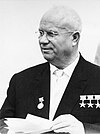Portal:Soviet Union/Selected biography
| This Wikipedia page has been superseded by historical reference. |
| Note: Article entries are now being transcluded directly on the main portal page. However, this page should be retained for historical reference. |
Instructions
- Add a new Selected biography to the next available subpage.
- The "blurb" for all selected biographies should be one or two paragraphs, for appropriate formatting in the main portal page.
- Update |
max=to the new total for its {{Random portal component}} on the main page.

Nikita Sergeyevich Khrushchev (April 15 [
Khrushchev was born in the
(More…)

Lavrentiy Pavlovich Beria (
Beria was the longest lived and most influential of Stalin's secret police chiefs, wielding his most substantial influence during and after
George Abramovich Koval (Russian: Жорж (Георгий) Абрамович Коваль, Zhorzh Abramovich Koval; December 25, 1913 – January 31, 2006) was an American who acted as a Soviet intelligence officer. According to Russian sources, Koval's infiltration of the Manhattan Project as a Glavnoye Razvedyvatel'noye Upravleniye (GRU) agent "drastically reduced the amount of time it took for Russia to develop nuclear weapons."
Koval was born to
Dmitri Dmitriyevich Shostakovich Russian pronunciation:
Shostakovich achieved fame in the
After a period influenced by
Alexei Nikolayevich Kosygin (
Mikhail Andreyevich Suslov (
Born in rural Russia in 1902, Suslov became a member of the All-Union Communist Party (Bolsheviks) in 1921 and studied economics for much of the 1920s. He left his job as a teacher in 1931 to pursue politics full-time, becoming one of the many Soviet politicians who took part in the mass repression begun by Joseph Stalin's regime. Suslov impressed the Soviet leadership to such an extent in the pre-Eastern Front Soviet Union that he was made First Secretary of Stavropol Krai administrative area. During the war, Suslov headed the local Stavropol guerilla movement. He became a member of the Organisational Bureau (Orgburo) of the Central Committee in 1946 and, four years later, was elected to the Presidium (Politburo) of the All-Union Communist Party. (more...)

Alexander Alexandrovich Alekhine (October 31 [
By the age of twenty-two, he was already among the strongest chess players in the world. During the 1920s, he won most of the tournaments in which he played. In 1927, he became the fourth World Chess Champion by defeating Capablanca, widely considered invincible, in what would stand as the longest chess championship match held until 1985.
In the early 1930s, Alekhine dominated tournament play and won two top-class tournaments by large margins. He also played first board for France in five
Pavel Vladimirovich Bure (Russian: Па́вел Влади́мирович Буре́; IPA: [ˈpavʲɪl buˈre]; born March 31, 1971) is a retired Russian professional ice hockey right winger. Nicknamed "the Russian Rocket" for his speed, Bure played for 12 seasons in the National Hockey League (NHL) with the Vancouver Canucks, Florida Panthers and New York Rangers. Trained in the Soviet Union, where he was known as "Pasha", he played three seasons with the Central Red Army team before his NHL career.
Selected 113th overall in the
(More…)
Gennady Ivanovich Yanayev (
Due to his chairmanship of the All-Union Central Council of Trade Unions he gained a seat in the
Andrei Pavlovich Kirilenko (
Pável Dimítrievich Turchanínov (
Eduard Anatolyevich Streltsov (Russian: Эдуа́рд Анато́льевич Стрельцо́в, IPA: [ɨdʊˈart ɐnɐˈtolʲjɪvʲitɕ strʲɪlʲˈtsof] ⓘ; 21 July 1937 – 22 July 1990) was a Soviet footballer who played as a forward for Torpedo Moscow and the Soviet national team during the 1950s and 1960s. A powerful and skilful attacking player, he scored the fourth-highest number of goals for the Soviet Union and has been called "the greatest outfield player Russia has ever produced". He is sometimes dubbed "the Russian Pelé".
Born and raised in east Moscow, Streltsov joined Torpedo at the age of 16 in 1953 and made his international debut two years later. He was part of the squad that won the gold medal

Vyacheslav Mikhailovich Molotov (
Valentin Sergeyevich Pavlov (Russian: Валентин Серге́евич Павлов; 27 September 1937 – 30 March 2003) was a Soviet official who became a Russian banker following the dissolution of the Soviet Union. Born in the city of Moscow, then part of the Russian Soviet Federative Socialist Republic, Pavlov began his political career in the Ministry of Finance in 1959. Later, during the Brezhnev Era, he became head of the Financial Department of the State Planning Committee. Pavlov was appointed to the post of Chairman of the State Committee on Prices during the Gorbachev Era, and later became Minister of Finance in Nikolai Ryzhkov's Second Government. He went on to succeed Ryzhkov as head of government in the newly established post of Prime Minister of the Soviet Union, and became de facto Chairman of the Cabinet of Ministers. (more...)
Nominations
- Adding articles
- Feel free to add Featured or Good Soviet Union biographies to the above list.
- If you are unsure or do not know how to add an entry, feel free to post a question, suggestion or nomination here below, or at the talk page Portal talk:Soviet Union.
